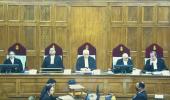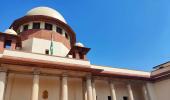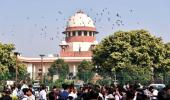'Upper castes who complain against reservations are fighting only for their own castes.'

The Supreme Court of India in a 3-2 verdict this week cleared the way for 10 percent reservation for Economic Weaker Sections in education and government employment, thus ending the long debate -- are reservations in India meant only for Other Backward Castes, Scheduled Castes and Scheduled Tribes, or can the poor among the forward castes also be brought under the ambit of reservations?
The majority judgment by Justices Dinesh Maheshwari, Bela Trivedi and J B Pardiwala upheld the 103rd Constitutional Amendment Act which introduced 10% reservation for EWS, while Chief Justice of India Uday Umesh Lalit and Justice S Ravindra Bhat wrote a dissenting judgment against the legislation.
While the majority verdict stated that the 103rd Constitutional Amendment does not violate the basic structure of the Constitution, Justices Lalit and Bhat stated, 'EWS quota is contradictory to the essence of equal opportunity and strikes at the heart of the equality code.
Syed Firdaus Ashraf/Rediff.com spoke to G Mohan Gopal, one of the arguing counsels for the petitioners in the case, to understand the implications of the judgment.
Dr Gopal was director of the National Judicial Academy of the Supreme Court of India from 2006 to 2011 From 2012-2019 he was the founder chair of the National Court Management Systems Committee of the Supreme Court of India. He is also former director (vice-chancellor) of the National Law School of India, Bengaluru.
The first of a two-part interview:
Almost every political party has welcomed the judgment upholding reservations for the Economically Weaker Sections. How do you see this considering that you were among the petitioners in the Supreme Court against the law?
I represented one of the petitioners as an arguing counsel, I am not a petitioner.
Only the Dravida Munnetra Kazhagam, Muslim League and Asaduddin Owaisi's party opposed the EWS bill in Parliament. All other parties had voted for EWS even though it was rushed in lightning speed through both Houses without a proper debate.
So, there is no surprise that the political parties that supported EWS in Parliament may be praising the majority judgment which endorses the misdeed they had done in Parliament.
The impression one gets is that even Other Backward Castes and Dalit groups have no objections to this judgment on reservations for the EWS.
There is widespread condemnation of the majority judgment amongst SC/ST/OBC communities across the country.
In the initial stages, large sections of people in the OBC, SC ST communities were misled to believe that EWS was what it claimed to be -- meant for all economically weaker sections irrespective of caste or creed.
While they knew it would benefit weaker sections amongst forward classes, they did not realise that they would be excluded from it. That EWS would exclude OBC, SC, ST was concealed behind convoluted legal language -- that EWS would be provided to classes other than the classes mentioned in Article 15(4) and and 16(4).
[Article 15(4) states: Nothing in this Article or in clause (2) of Article 29 shall prevent the State from making any special provision for the advancement of any socially and educationally backward classes of citizens or for the Scheduled Castes and the Scheduled Tribes.
[Article 16(4) states: Nothing in this Article shall prevent the State from making any provision for the reservation of appointments or posts in favour of any backward class of citizens which, in the opinion of the State, is not adequately represented in the services under the State.
[Source: Indiankannon.org]
There was a lot of deception in passing this bill in Parliament
Parliament did not say in straightforward language that this law would exclude the poor amongst OBCs, SCs, STs and be limited to the Economically Weaker Sections among the forward castes. Now, since the law has come into effect, people are understanding more clearly the casteist nature of EWS.
If it had been clearly mentioned that this law was meant for the poor among the upper castes, there would have been a different reaction to it.
Does it mean that reservations have now become a poverty alleviation programme in India now?
That reservations would address poverty is a quite hollow justification given the small number of jobs in government that are subject to reservation.
The essence of Article 16(4) is the right of all social classes to adequate representation in governance to establish a representative State which is the foundation of democracy. Reservation is only a tool. Our struggle is for representation, not for reservation.
EWS takes a 10 percent chunk of reservations and converts it into a space exclusively for over-represented communities, free of democratic representation. This sets back the struggle for representative government.
The Judiciary and Executive are controlled by an oligarchy of a handful of communities. Article 16(4) reservations, even after being narrowed a lot by the judiciary, still provided a little space for other classes to be represented. Even this is now under attack.
The real purpose of EWS is to reduce representation of OBC, SC, ST in the Judiciary and the Executive, to prevent the emergence of a representative State and to protect and preserve the oligarchy that today controls power and resources in our country.
Is the concept of reservation itself an anti-Brahmanical order?
Reservation is not anti-anything. Reservation is all about establishing a representative government and a representative State in the Executive and Judiciary. This is the objective of all democracies.
A representative State is a fundamental pillar of a democracy so that the State will match up to the aspirations of all sections of the population.
If a day comes when the upper castes of India are in the same situation as Muslims, OBC and SC ST today -- without representation in the Indian State -- the principle that government should be representative of all communities will protect them from marginaliSation and exclusion.
All of us have a stake in protecting the principle of representative government.
The upper caste poor have always felt that they were not considered in the admission process compared to Dalits and OBCs and that their only fault was that their caste was wrong. Don't you feel this EWS reservations will help such people?
Why is this complaint not there on the part of upper caste poor males against reservation for women, including upper caste women?
Are they not excluded to make space for women of their own caste exactly in the same way as when they are excluded to make space for non creamy layer OBC, SC ST males and females?
Yet, they don't complain because they realise that reservation for women benefits women of their own caste as well.
So what complaining upper castes are really concerned about is the interests of their castes. They want to maintain the dominance of their castes.
On the other hand we are fighting for a State that represents all social classes including the upper castes.
We are fighting for all. Upper castes who complain against reservations are fighting only for their own castes.









